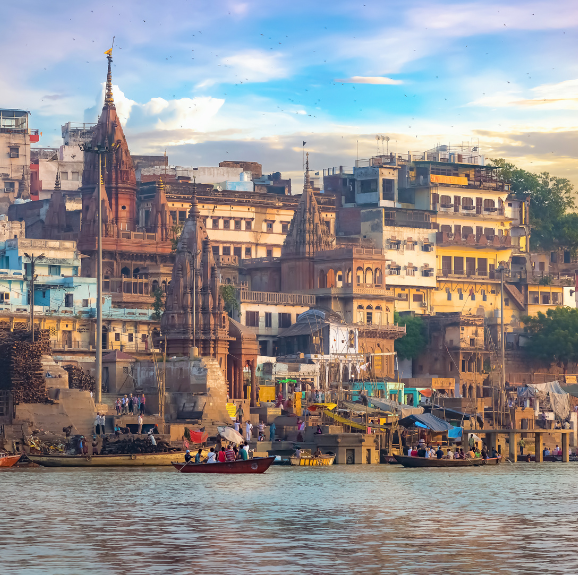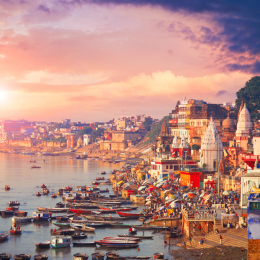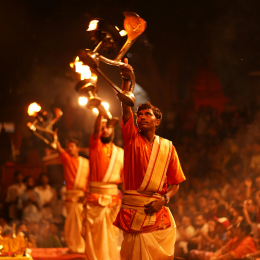Varanasi, located in the northern state of Uttar Pradesh, is one of the world's oldest continuously inhabited cities and holds an esteemed place in the religious, cultural, and historical fabric of India. Often referred to as Kashi (the "City of Light")
or Banaras, Varanasi is considered the spiritual capital of India and is one of the holiest cities in Hinduism. Situated on the banks of the Ganges River, the city serves as a vital pilgrimage destination
for millions of devotees, scholars, and spiritual seekers. With a history that spans over 3,000 years, Varanasi stands as a living testament to India's deep spiritual and cultural heritage.
Varanasi: The Spiritual Heart of India
Uttar Pradesh, India



Overview
Historical and Spiritual Significance
Varanasi's history is both ancient and profound. The city's mention in ancient scriptures like the Rigveda and Mahabharata places it among the oldest living cities in the world. It is believed to be founded by the Hindu god Shiva, making it a primary
pilgrimage destination for followers of the Hindu faith. The city is considered a place where one can attain moksha (liberation from the cycle of life and death), and it is deeply intertwined with the beliefs
and practices of Hinduism. Varanasi is famous for its ghats, which are steps leading to the banks of the Ganges River. These ghats are central to the spiritual practices of Varanasi, where daily rituals
of worship, bathing, and cremation take place. The city’s ghats are not only religious landmarks but also vital components of the local culture and life cycle. The Ganga Aarti, an elaborate evening prayer
ceremony held at Dashashwamedh Ghat, is a mesmerizing spectacle that attracts hundreds of devotees and tourists. The ritual involves the offering of fire, incense, and flowers to the river while chanting
sacred mantras, creating a spiritually uplifting atmosphere.
Key Attractions
Kashi Vishwanath Temple
The Ghats of Varanasi
The Ganga Aarti
Banaras Hindu University (BHU)
Sarnath
Temples and Shrines
Beyond its religious significance, Varanasi is also a vibrant cultural center, known for its contributions to classical music, dance, literature, and arts. The city has been home to many legendary musicians, poets, and artists, and it continues to be
a hub for Indian classical music and dance.
Classical Music and Arts:
- Varanasi is often considered the birthplace of classical music, particularly Hindustani classical music. Many famous musicians, including Pandit Ravi Shankar (sitar virtuoso) and Ustad Bismillah Khan (shehnai maestro), hail from this city. Visitors can experience live performances and musical sessions at local ghats and temples, particularly during festivals and special events.
Banarasi Silk and Handicrafts:
- Varanasi is globally renowned for its silk weaving, particularly Banarasi sarees, which are intricately woven with gold and silver threads. The craft of weaving these luxurious sarees has been passed down through generations. The city is also known for its brassware, woodwork, and stone carvings, which can be found in local markets.
Varanasi offers a wide array of mouthwatering traditional foods, and food lovers will find a vibrant mix of local delicacies and street foods. Some notable dishes include:
- Chaat: Pani puri, Aloo tikki, and Kachori are popular street foods in Varanasi.
- Banarasi Paan: The city is famous for its unique and flavorful paan (betel leaf), which is often consumed as a digestive aid.
- Lassi: The city serves delicious lassi, a yogurt-based drink, which is thick, creamy, and often flavored with fruit or spices.
- Kachaudi and Sabzi: A breakfast staple in Varanasi, this combination of spicy vegetable curry and crispy kachoris is a must-try.
Varanasi has a humid subtropical climate, with hot summers, a monsoon season, and mild winters:
Summer (March to June):
- The city experiences hot and dry weather with temperatures soaring above 40°C (104°F) in peak months.
Monsoon (July to September):
- During the monsoon season, Varanasi receives moderate rainfall, offering some respite from the heat. tour.
Winter (October to February):
- Winters are mild, with temperatures ranging between 5°C and 15°C (41°F to 59°F), providing a comfortable time to explore the city.
Conclusion
Varanasi is a city where the divine and the mundane coexist, offering a rare glimpse into the spiritual and philosophical depths of Indian culture. The city's sacred ghats, historical temples, rich traditions, and bustling streets filled with life make
it a place of immense spiritual power. Whether you are here to witness the Ganga Aarti, explore ancient temples, or delve into the city's rich cultural heritage, Varanasi offers an unparalleled experience
that touches the soul. Known as the "City of Light," Varanasi continues to shine as one of the most enchanting and significant cities in the world.

